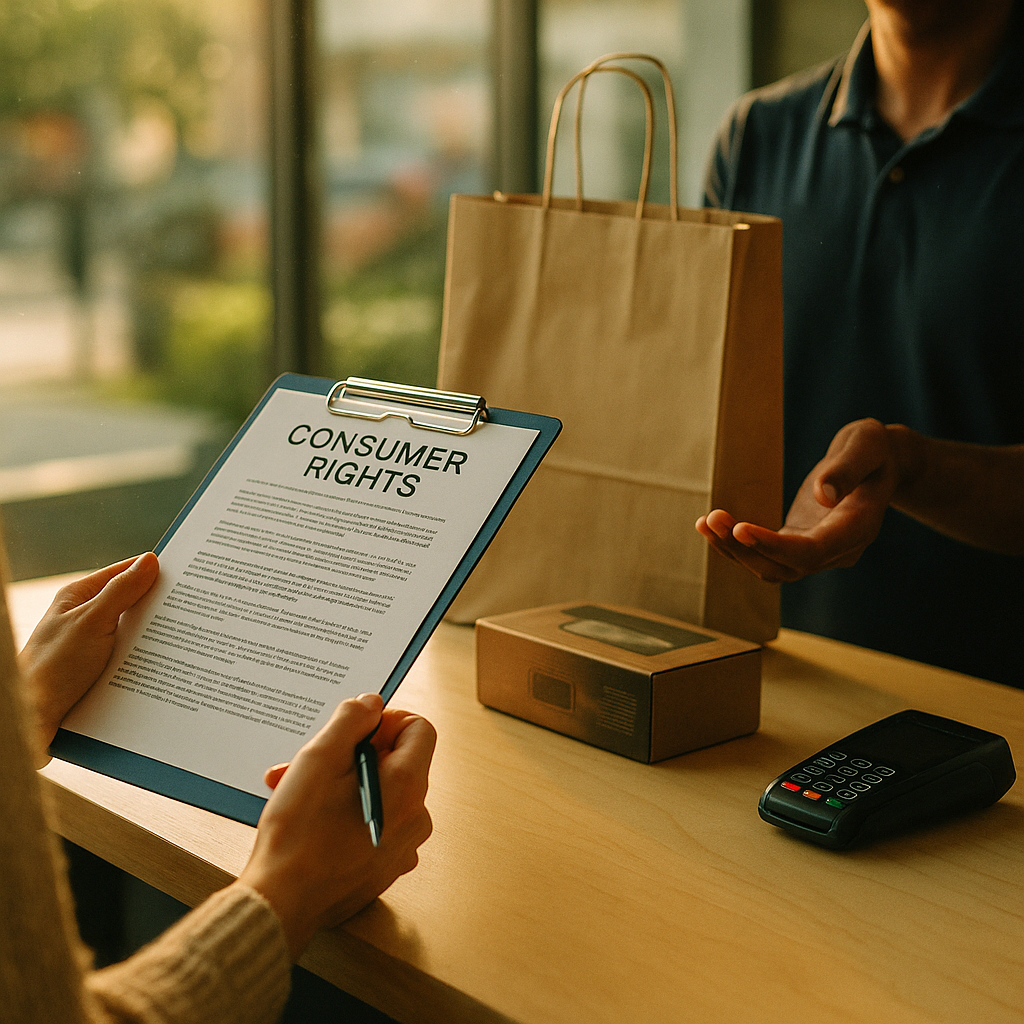Understanding your consumer rights and a brand’s legal responsibilities is crucial for both shoppers and business owners in 2025. These principles define fair transactions and protect your interests in case things go wrong. Ready to empower your purchases and business practices? Discover essential insights in our comprehensive guide below.
Consumer Rights Explained: The Fundamentals Everyone Should Know
Consumer rights are the foundation of fair and ethical trade. They protect buyers from unfair practices and ensure access to quality products and services. In many countries, including the UK, US, and across the EU, core consumer rights include:
- The right to safety: Products must not cause harm when used correctly.
- The right to information: Clear, accurate information must be provided before a sale.
- The right to choose: Competition and a variety of choices must be available.
- The right to be heard: Consumers can voice concerns or complaints.
Recent global surveys by the UN Conference on Trade and Development revealed that over 60% of consumers feel more confident shopping with brands that champion these rights. Understanding these basics is the first step to protecting yourself in every transaction.
How to Exercise Your Legal Rights as a Consumer
Legal rights for buyers empower you to demand fair treatment and compensation in case of faulty goods or subpar services. Here’s how you can put your rights into action in 2025:
- Keep records of receipts, contracts, and communications with vendors.
- Contact the business directly to resolve issues promptly.
- If unsatisfied, escalate the issue to consumer protection agencies or relevant ombudsman services.
For online and cross-border purchases, recent legislation ensures support for returns, refunds, and dispute resolution. Always check a brand’s consumer complaint policy before making purchases, especially from newer online platforms.
Understanding Brand Obligations: Key Legal Responsibilities of Businesses
Legal responsibilities of brands go beyond just delivering goods. Every company must:
- Sell safe, quality products that comply with local and global standards.
- Accurately describe offerings in advertising and product information.
- Honor warranties and guarantees within stated timeframes.
- Protect consumer data in line with privacy regulations, such as GDPR in Europe and CCPA in California.
Failure to meet these obligations can result in hefty fines and irreparable reputation damage. In 2024, a major electronics retailer in the US was fined $8 million for misleading product claims, highlighting the real-world impact of neglecting legal duties.
Recent Changes to Consumer Protection Laws in 2025
2025 consumer protection updates have ushered in enhanced rights for digital purchases and e-commerce. Here are the most notable changes impacting you this year:
- Extended return windows for online purchases, now up to 45 days in some regions.
- Stricter data privacy requirements, especially for mobile app purchases.
- Mandatory transparency in AI-powered purchase decisions and automated recommendations.
Staying informed about these developments ensures you maximize your protections and avoid outdated practices. Brands, on the other hand, must adjust swiftly to compliance standards or risk penalties and loss of consumer trust.
Filing Complaints and Resolving Disputes: Safe Steps for Consumers
How to file a consumer complaint is a skill every shopper should master. Here’s a simple step-by-step process for 2025:
- Gather documentary evidence, such as purchase confirmation and correspondence.
- Contact the brand’s customer service department, explaining your issue clearly.
- If unsatisfied, submit a formal complaint to a recognized consumer protection body or ombudsman.
- For unresolved cases, consider small claims court or online dispute resolution platforms like ODR Europe.
Recent EU data shows over 80% of disputes get resolved at the first or second step when consumers follow these protocols. Knowing the right channels increases your chances of quick, favorable outcomes.
Building Trust: Why Transparency and Ethical Practice Matter for Brands
Brand transparency and consumer trust are intertwined. In 2025, consumers expect businesses to go beyond legal minimums. Proactive disclosure, honest marketing, and genuinely addressing feedback foster loyalty and word-of-mouth. According to a 2025 Edelman Trust Barometer update, 75% of buyers choose brands perceived as ethically responsible, even if prices are higher.
Brands that value consumer rights don’t just avoid lawsuits—they gain lifelong customers. For shoppers, rewarding such businesses supports a fairer, safer marketplace for all.
Understanding consumer rights and a brand’s legal responsibilities puts power in your hands, ensuring safer purchases and ethical business growth. Stay informed, act confidently, and support brands that respect your rights—building a marketplace that works for everyone.
FAQs on Consumer Rights and Brand Legal Responsibilities
-
What are consumer rights?
Consumer rights are legal protections ensuring fair treatment, access to information, product safety, and redress in cases of faulty goods or services. -
What legal obligations do brands have toward customers?
Brands must provide safe, accurately described products, honor guarantees, and comply with data privacy laws. They should respond promptly to complaints and uphold ethical advertising. -
How can I file a complaint if a brand violates my rights?
Start by contacting customer service, keeping a record of your communications. If needed, escalate to a consumer protection agency or seek resolution through online platforms or the courts. -
Are there differences between online and in-store consumer rights?
Online purchases often include extended return periods and specific privacy protections. Consumer rights apply to both, but legislation may add extra safeguards for digital transactions. -
Have there been recent changes to consumer protection laws?
Yes, in 2025 there are new rules for longer return windows, stricter digital data protection, and transparency in AI-guided purchases. Stay updated to ensure you benefit from these enhancements.
